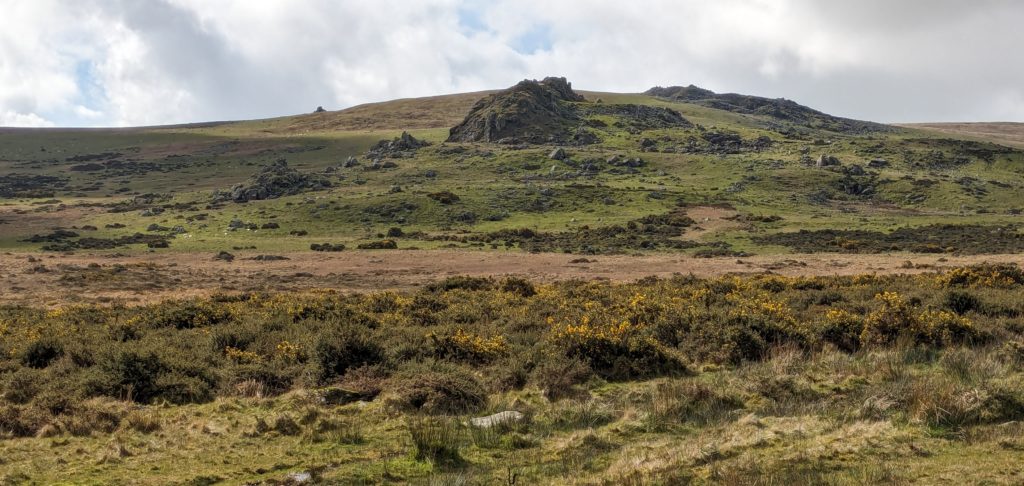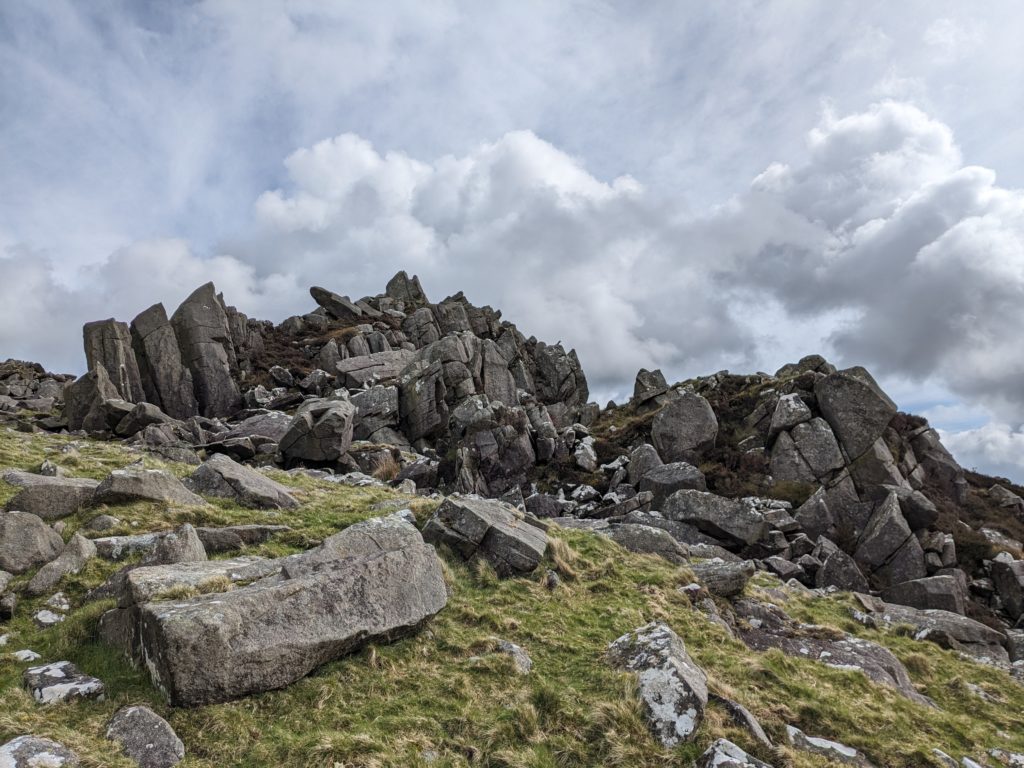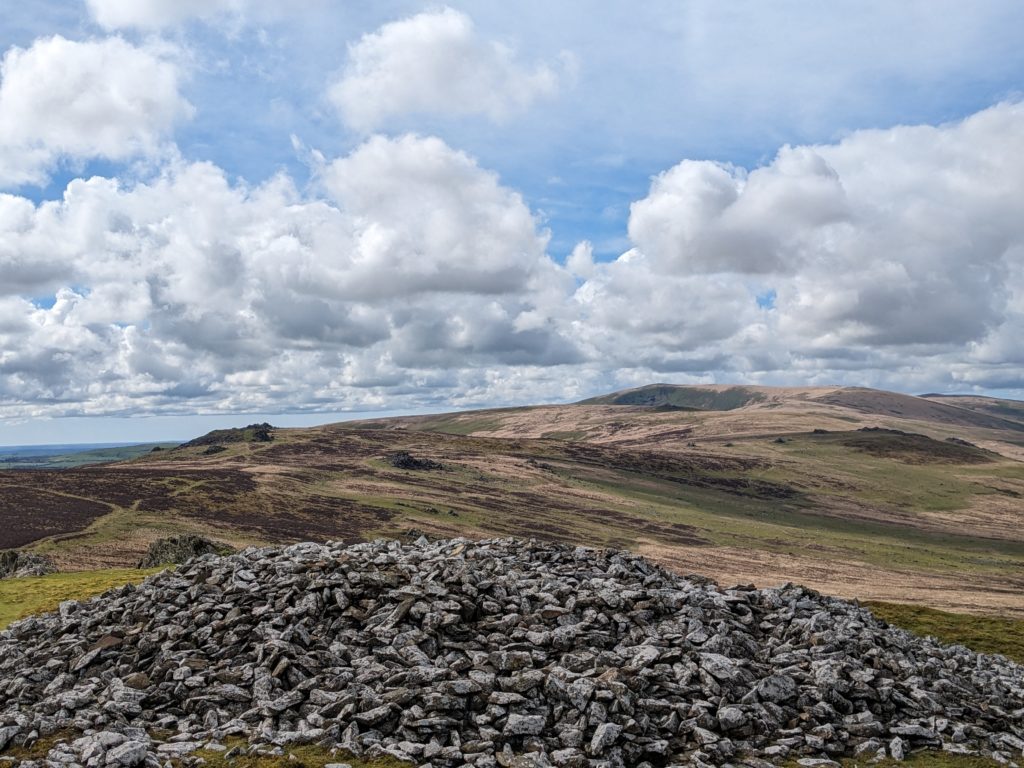Letter from the Preseli Hills

Lefi Aled Dafydd
Walking along the feidr, the chronically potholed track that stretches across Rhos Glynmaen towards our house, I notice that the unexpected arrival of the sun has brought some life to the mostly damp, dull-coloured rhos.
The clumps of long grass and shrivelled trees stand proud in the light as I start my walk across the parishes of Meline and Eglwyswen, towards the eastern cairns of the Preseli Hills.
These two sparsely populated parishes in Northwest Pembrokeshire, between Crymych and Brynberian, don’t have anything extremely exciting to offer, especially to my internationalist seventeen-year-old self.
Bound by the Preseli hills to the south and Afon Nyfer to the north, at least we have intriguing footpaths.
The popular nineteenth-century song ‘Y Mochyn Du’ was composed by a farmhand as he walked across Meline from farm to farm, so there must be something inspiring about them.
We also have many prehistoric standing stones and hillforts, and possibly (but improbably) King Arthur’s grave – Bedd Arthur near Carn Bica – but the area seems to have quietened down sometime after the end of the Iron Age.
Despite the apparent emptiness of these parishes, I know them as my homeland. That is non-negotiable.
By the roadside of Rhos Glynmaen, the rubbish of generations lies, hidden under the boggy soil and the browning red cloak of autumns passed.
It was there, under those trees that the Tylwyth Teg, the fairies, would dance in a bottomless pool, before, being unsuited to the human world, Pwll-y-Gwŷdd was filled up by the council with rubbish.
Walking through the woods, the hills, past the ruins of cottages and forgotten civilisations, it feels like catching a glimpse of the Tylwyth Teg might not be that implausible here.
I walk upstream towards the mynydd, past a few homes that once belonged to old Welsh smallholders, before their centuries-long dynasties withered away with the twentieth century.
From the scraggly trees, the mynydd arises, the orange-green barrenness of the smooth slopes crowned by the imposing Carn Alw.
This cairn, an impregnable fortress daring those below, beckons to be climbed.

Reaching the gate that leads onto the mynydd, the smell of horse, of gorse, of grasses reaches my nose. Here, below the hills, amongst the gorse’s prickly spears, the stream froths in its agitation to leave the mountain, swishing, booming past moss-enveloped stones, and suffocating trees.
The barren slopes around Carn Alw and Foel Drygarn offer little to the innumerable streams that start their lives here, with this stream craving the open seas of Bae Ceredigion instead. Yet another betrayal.
But am I not guilty of this? Seduced by the magic, the knowledge of England’s far east, I don’t know if I will be able to call this Rhos my home in the future. Carn Alw looks down disapprovingly on yet another (nearly) lost child.
Mighty stones, that must have been thrown by giants, litter the landscape under Carn Alw’s dreadful authority. Millenia of exposure to the Preseli wind and rain have left them cracked, and torn apart, immortal but forever dying.
The clouds gather, it is grey. The world feels old up here. Gangs of hardened mountain sheep glare down at my minuscule presence ascending their hillfort.
The toughest of all, these sheep have become walking rock, their once white fleeces grey, and their manes painted black by the burnt gorse.
From Carn Alw’s top I see the cantref of Cemais below my feet; Carn Ingli, the ‘angels’ cairn’ closing in on us from the west, and the purple cloak of Frenni Fawr, once a campsite for the now famous Macsen Wledig, closing in from the east.
Between them, live the people of Cemais, hiding indoors in cottages, farms, amongst the damp moors, in the Nyfer valley, under austere grey chapels, and over the cliffs by Tudrath. Above them all, the Preseli Hills.

As I climb further up into the hills, the wind strengthens. I reach Carn Meini and look over towards the south – towards Mynachlog-ddu and Maenclochog, and beyond, towards the Landsker line and the green plain of South Pembrokeshire.
Tall, bony rocks point out of the cairns of Carn Gwr, sticking a vengeful middle finger towards the cultivated tilth to the north and south. The towers of Pembroke Oil Refinery gleefully stick theirs up back from the far south.
I walk eastward, away from the approaching dark clouds promising heavy Atlantic rain. To my left-hand side, a forest appears. A plantation of conifers, a scar left by the Second World War on our slopes. The breeze through the trees generates a constant woosh of sound, unnatural on these ancient hills.
We’re lucky that it is only the conifers that remain of the War Office’s attempts to turn these hills and the surrounding villages into a military training ground after the Second World War. This would have been like another Epynt, but affecting three times as many families.
The War Office’s plans caused a campaign with now legendary status, rallied on by the now near-mythological poet Waldo Williams (1904-1971) and his poems, as well as the ministers of our numerous chapels. ‘Brwydr y Preselau’ was won, with words.
Suddenly, to my right I hear the skylark, singing clearly, and see its gracious hovering, its song seeming impossibly loud for a speck floating on the wind. It comes closer. Closer. Then, silently, it dives, swooping towards the heather, and leaving me alone with that forest’s evergreen woosh.

As I walk towards Foel Drygarn, the sun emerges from the clouds, and the air fills with the sound of birds, mostly skylarks, as well as some bees and hikers.
The mountain isn’t dead. Life rushes through the heather, and plummets through the air.
I descend from Foel Drygarn, reaching the edge of ‘y mini’. Here, the gorse absorbs the sun’s rays, and its bright yellow flowers emanate a sweet mead-like warmth.
I have a long walk home, but, being in Pembrokeshire, that isn’t a bad thing at all…
Support our Nation today
For the price of a cup of coffee a month you can help us create an independent, not-for-profit, national news service for the people of Wales, by the people of Wales.






The magic of the Preselau casts its spell on a young native which will guide him through the rest of his life.
Diolch! Byddan nhw “wrth fy nghefn ym mhob annibyniaeth barn”, fel dywedodd Waldo.
What an excellently written, moving piece – da iawn ti